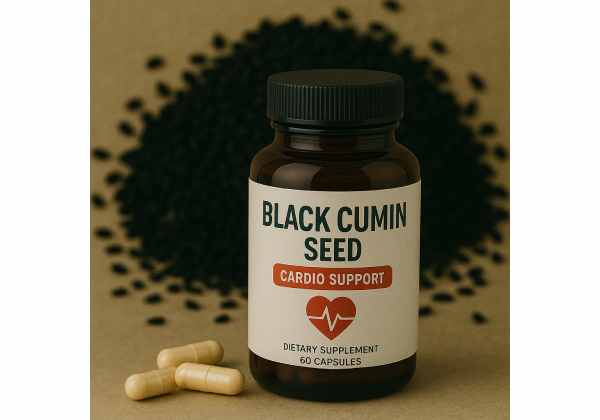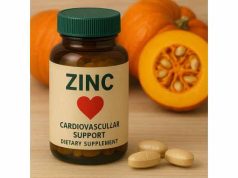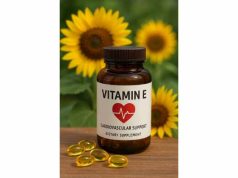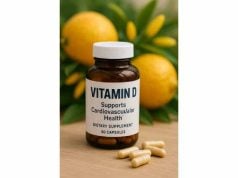
Conditions
Black Cumin Seed, also known by its scientific name Nigella sativa, has drawn considerable attention for its profound role in enhancing Heart Health, supporting Cardiovascular function, and potentially helping to prevent chronic heart ailments. Whether you’re looking to balance your cholesterol, regulate blood pressure, or fortify arterial wellness, Black Cumin Seed emerges as a time-tested solution backed by emerging scientific studies. In this comprehensive article, we’ll explore the plant’s rich history, examine its active compounds, and uncover how it can provide Vascular Support. Discover how Black Cumin Seed Benefits for Heart Health may offer you a natural path to improved well-being.
Table of Contents
- In-Depth Look: Origins and Composition of Black Cumin Seed
- Breaking Down the Mechanisms of Nigella sativa
- Science-Driven Insights into Cardioprotective Effects
- Recommended Intake, Safe Practices, and Potential Risks
- Frequently Asked Questions
- References and Sources
In-Depth Look: Origins and Composition of Black Cumin Seed
Historical Background
Black Cumin Seed (Nigella sativa) is native to parts of Southwest Asia, the Mediterranean, and Northern Africa. For centuries, cultures in these regions have valued its peppery seeds for both culinary and medicinal purposes. Historical texts such as the writings of the Greek physician Dioscorides reference the seeds’ applications, illustrating how deeply ingrained Black Cumin Seed is in traditional wellness practices. In Islamic tradition, it’s called “Habbat al-Barakah,” translating to “the seed of blessing,” reflecting the belief that it can address a wide array of health concerns.
Over time, Black Cumin Seed has journeyed across continents, weaving itself into healing protocols in India, the Middle East, and Africa. Today, integrative health enthusiasts worldwide embrace it for a range of benefits, especially for Heart Health and broader metabolic support.
Key Active Compounds
The efficacy of Black Cumin Seed for Cardiovascular Health lies in its unique chemical composition:
- Thymoquinone
- Perhaps the most researched constituent, thymoquinone is a potent antioxidant and anti-inflammatory compound. It’s credited with neutralizing free radicals that can damage arteries and other tissue, and it appears to regulate oxidative stress within the heart and vascular system.
- Volatile Oils
- Black Cumin Seed’s distinctive aroma stems from volatile oils like p-cymene and carvacrol. These oils may further support the seed’s anti-inflammatory properties and help maintain healthy blood lipids.
- Alkaloids and Saponins
- Alkaloids such as nigellidine and nigellimine are believed to help modulate immune responses. Saponins, on the other hand, can bind to cholesterol in the gut and support healthy lipid metabolism.
- Protein and Amino Acids
- Though not as commonly spotlighted, Black Cumin Seed does contain moderate amounts of protein and essential amino acids, which are fundamental for overall body repair and cardiovascular function.
Culinary and Cultural Roots
- Cooking Ingredient: In Indian, Middle Eastern, and Mediterranean cuisines, Black Cumin Seed is used to flavor bread, curry dishes, and pickles. Its somewhat nutty yet peppery taste enhances both sweet and savory recipes.
- Traditional Medicine: For centuries, the seeds or oils have been used to support digestive processes, ease respiratory complaints, and boost immunity.
- Modern Adaptations: Beyond cultural dishes, contemporary diets sometimes incorporate black cumin in salad dressings, smoothies, or as a finishing touch on roasted vegetables. Its popularity has also soared in herbal tea blends and nutraceutical supplements.
Harvesting and Processing
Harvesting Black Cumin Seeds generally involves letting the plant’s pods mature until they dry and release the seeds. After collection, seeds may be:
- Cold-Pressed to produce black seed oil, retaining volatile compounds without heat degradation.
- Sun-Dried or oven-dried before being ground into a powder for use in supplements and culinary applications.
The quality of seeds can vary significantly, depending on factors like soil, climate, and harvesting techniques. Ensuring a reputable source can maximize the potential for consistent antioxidant and anti-inflammatory benefits.
Why It’s a Standout for Heart Health
Black Cumin Seed for Vascular Support stands out among natural remedies due to the breadth of its active substances. While many plants can claim antioxidants or anti-inflammatories, Black Cumin Seed’s synergy of thymoquinone, vitamins, minerals, and beneficial fats makes it particularly intriguing. This comprehensive nutritional profile positions the seed as a multi-functional supplement, tackling everything from arterial flexibility to lipid management.
Breaking Down the Mechanisms of Nigella sativa
Black Cumin Seed Helps Cardiovascular Function through a complex interplay of biochemical pathways. These pathways help explain why it has been revered across cultures for centuries and why modern research is increasingly attentive to its cardiac benefits.
Thymoquinone’s Role
Thymoquinone is at the core of Black Cumin Seed’s acclaim. It offers a protective shield to cells by:
- Regulating Oxidative Stress: Free radicals are reactive molecules that can degrade cellular structures and escalate the development of plaque in the arteries. Thymoquinone diminishes the formation of these damaging radicals, lowering the oxidative burden on the vascular system.
- Modulating Inflammation: Chronic inflammation can undermine cardiovascular tissues, making them susceptible to atherosclerosis and other ailments. Thymoquinone appears to influence inflammatory enzymes like cyclooxygenase (COX) and lipoxygenase (LOX), curbing inflammatory signaling.
Enhanced Cholesterol Metabolism
One of the pillars of Black Cumin Seed Benefits for Heart Health is its apparent capacity to aid in cholesterol management. Some studies posit that the seed’s natural oils and saponins may:
- Bind LDL Particles: Binding to LDL (“bad” cholesterol) can aid in excreting these lipoproteins rather than allowing them to oxidize and deposit within arterial walls.
- Raise HDL Levels: Certain research trials suggest a slight increase in HDL (“good” cholesterol) among participants consuming black cumin supplements, improving the overall lipid ratio.
Hypotensive Effects
Excessive blood pressure is a prime factor in multiple cardiovascular conditions. Some data points to black cumin’s possible mild hypotensive influences:
- Vasodilation: Through nitric oxide upregulation, black seed compounds might help dilate blood vessels, facilitating more efficient blood flow and placing less strain on the heart.
- Balance of Electrolytes: Emerging hypotheses suggest that black cumin’s nutrients, such as potassium and magnesium, might play a secondary role in maintaining optimal fluid balance, which has implications for stable blood pressure levels.
Regulation of Blood Sugar
While primarily recognized for heart health, black cumin’s properties may help moderate glucose metabolism. Maintaining steady blood sugar indirectly benefits cardiovascular function by reducing the risk of insulin resistance, metabolic syndrome, and the accompanying vascular complications that can arise from high blood sugar.
Antiplatelet and Anticoagulant Possibilities
Excessive platelet aggregation or clotting within vessels is a significant risk factor for heart attacks and strokes. Preliminary findings indicate that black cumin compounds may offer subtle antiplatelet effects:
- Reduction in Platelet Activation: By limiting signals prompting platelet clumping, black cumin seed could diminish the likelihood of arterial blockages.
- Improved Blood Fluidity: Enhanced circulation supports tissue oxygenation and nutrient distribution, essential factors in a well-functioning cardiovascular system.
Gut Microbiome Interactions
Increasingly, scientists recognize that a balanced gut microbiome is central to overall and cardiac health. Emerging studies speculate that black cumin may foster beneficial bacteria growth, while modulating harmful strains that can produce toxins. This intestinal harmony might lower systemic inflammation, translating into greater heart protection.
Synergy with Other Nutrients
It’s worth emphasizing that black cumin seed rarely acts in isolation. Its active constituents often function synergistically:
- With Omega-3s: Many health advocates recommend combining black cumin oil with fish oil or flax oil. This may amplify the anti-inflammatory impact, further reinforcing the cardiovascular system.
- With Antioxidants: Consuming black cumin alongside vitamin C, E, or other polyphenol-rich foods might deliver stronger oxidative-stress defense, benefiting arteries and capillaries alike.
Collectively, these mechanisms reveal why Nigella sativa has such a storied reputation across cultures. By intersecting with a range of biochemical processes—antioxidant defense, lipid regulation, blood pressure modulation, and beyond—Black Cumin Seed stands as a compelling ally in the quest for robust Cardiovascular Health.
Science-Driven Insights into Cardioprotective Effects
Studies exploring Black Cumin Seed for Heart Health continue to expand, providing evidence-based arguments that back up long-standing traditional uses. As more clinical trials and laboratory analyses emerge, our understanding of Nigella sativa’s impact on cardiovascular markers becomes increasingly sophisticated.
Lipid Profile Improvements
One of the principal focuses has been on how black cumin supplementation affects cholesterol and triglyceride levels:
- LDL Cholesterol Reduction: Randomized controlled trials have documented modest yet statistically significant decreases in LDL among participants taking black cumin oil or seed extracts for several weeks.
- HDL Cholesterol Increases: Some research highlights an upturn in HDL, suggesting a potential balancing effect on overall cholesterol ratios. Improved ratios are commonly associated with decreased atherosclerosis risk.
Representative Study
- A well-cited study involved participants with mild to moderate hyperlipidemia. Over eight weeks, the group receiving black cumin saw their LDL levels drop more sharply than the placebo group, while HDL in the black cumin cohort showed an uptick, though modest.
Blood Pressure Regulation
Evidence points to mild antihypertensive outcomes linked to black cumin supplementation:
- Clinical Findings: Trials with hypertensive or prehypertensive patients revealed meaningful systolic and diastolic pressure reductions, compared to a control group.
- Possible Mechanisms: These improvements may result from vasodilatory actions and the balancing of electrolytes.
Noteworthy Research
- In a double-blind trial, volunteers with mildly elevated blood pressure took black cumin seed extract capsules twice daily. After 12 weeks, average blood pressure readings improved significantly, reflecting enhanced vascular flexibility without notable adverse effects.
Anti-Inflammatory and Antioxidant Indices
Inflammation and oxidative stress are underlying factors in numerous cardiovascular complications. Multiple investigations have measured changes in markers like C-reactive protein (CRP) and lipid peroxidation levels:
- Lower CRP: Some participants experience declines in CRP, suggesting reduced systemic inflammation.
- Reduced Oxidative Stress: By analyzing malondialdehyde (MDA) levels—an indicator of oxidative damage—researchers noted a downward trend, hinting at robust free-radical scavenging by black cumin’s active compounds.
Improvement in Endothelial Function
An emerging area of interest is how black cumin might promote endothelial health, especially the tissue lining blood vessels:
- Nitric Oxide Synthesis: Enhanced NO availability fosters vessel dilation and might discourage the progression of plaque deposits.
- Microcirculatory Benefits: Beyond large arteries, black cumin can positively influence small vessels, potentially affecting conditions like varicose veins or diabetic microangiopathy.
Metabolic Impact
Because metabolic syndrome clusters conditions like high blood pressure, abnormal cholesterol, and elevated blood sugar, black cumin’s multi-targeted approach makes it a prime candidate for mitigating these interconnected factors:
- Glycemic Control: Clinical studies show reduced fasting glucose levels in some individuals who included black cumin in their routine, indicating potential synergy with diabetic treatments.
- Weight Management: While black cumin is not a magic weight-loss pill, a few studies suggest that it may aid appetite regulation or fat metabolism, indirectly supporting cardiovascular health by curbing obesity-related risks.
Holistic Perspective on Heart Health
Collectively, these science-based observations emphasize how black cumin seed addresses multiple heart risk elements simultaneously. Rather than isolating a single mechanism, it acts on numerous processes: lipid metabolism, inflammation, vascular tension, and even metabolic control. This integrated approach resonates with traditional medicine’s holistic view of health, further justifying black cumin’s popularity among those seeking natural supplements.
Limitations and Ongoing Research
While the outcomes are generally promising, it’s essential to acknowledge gaps:
- Variability: Different extracts vary in thymoquinone content, causing inconsistent results.
- Dosage Differences: Some studies employ significantly higher or lower dosages, complicating direct comparisons.
- Long-Term Data: Many trials are relatively short. Longer studies are needed to verify sustained cardiovascular benefits and determine optimal usage patterns.
Nonetheless, the current landscape of research strongly supports Black Cumin Seed Helps Cardiovascular Function. As more large-scale, placebo-controlled studies emerge, health practitioners gain a clearer picture of best practices for dosing, formulation, and combining black cumin with other beneficial nutrients.
Recommended Intake, Safe Practices, and Potential Risks
Understanding how to integrate Black Cumin Seed for Cardiovascular Health effectively involves striking a balance between the right dosage, usage methods, and awareness of any possible side effects. Below is a detailed overview to help you make an informed decision when introducing Nigella sativa into your wellness routine.
Typical Dosage Guidelines
- Whole Seed: Some prefer to consume 1 to 2 teaspoons of the seeds daily. You can sprinkle them on salads, add them to baked goods, or blend them into smoothies.
- Oil Form: Often taken in doses between 1 to 2 teaspoons per day. This can be consumed straight or mixed with honey, warm beverages, or salad dressings to mask the strong flavor.
- Capsules: For individuals who dislike the taste, capsules range from 500 mg to 1,000 mg per dose. Check the product label for standardized thymoquinone concentration if possible.
Timing and Pairings
- With Meals: Taking black cumin seed oil or capsules alongside meals may reduce digestive irritation and improve nutrient assimilation.
- Combined with Other Supplements: Some people pair black cumin with Omega-3s or other antioxidants like vitamin C to amplify anti-inflammatory and lipid-lowering outcomes.
Quality and Purity Considerations
Source reliability matters. To get consistent results from Black Cumin Seed Benefits for Heart Health, look for:
- Cold-Pressed Oils: Heat can degrade volatile compounds, including thymoquinone. “Cold-pressed” denotes minimal heat used during extraction.
- Reputable Brands: Choose products with transparent labeling regarding the source of seeds, extraction process, and concentration of active ingredients.
Potential Interactions with Medications
- Anticoagulants: If you’re already taking blood thinners (e.g., warfarin), be mindful that black cumin may exert mild antiplatelet effects. Consult your healthcare provider to avoid excessive bleeding risk.
- Antidiabetic Medications: Because black cumin may lower blood sugar, combining it with prescription antidiabetics could lead to hypoglycemia if dosing isn’t adjusted carefully.
- Antihypertensive Drugs: Similarly, if you’re on medications for high blood pressure, black cumin could intensify those effects.
Known Side Effects
For the vast majority of people, black cumin seed is safe when used in moderate amounts. However, potential side effects may include:
- Gastrointestinal Discomfort: Excess consumption might lead to stomach cramps, gas, or bloating.
- Allergic Reactions: Rare but possible. Watch for skin rashes, itching, or other signs of an allergic response if trying black cumin for the first time.
- Low Blood Pressure or Blood Sugar: Those predisposed to hypotension or hypoglycemia should monitor levels more diligently.
Special Populations
- Pregnant or Nursing Women: While dietary amounts (such as sprinkling seeds on foods) are generally considered safe, higher supplement doses lack substantial research confirming safety. Consultation with a healthcare provider is advisable.
- Children: Culinary use in meals is typically safe, but supplementation at high doses is not well-studied in children.
- Older Adults: The elderly can especially benefit from black cumin’s heart-friendly properties but may also be more prone to medication interactions. Personalized advice from a doctor or pharmacist is key.
Practical Tips for Incorporating Black Cumin Seed
- Start Low, Go Slow: Begin with a smaller dose to see how your body responds, then increase gradually if necessary.
- Stay Hydrated: Adequate fluid intake can help your body adapt to any changes in digestion from new supplements.
- Document Changes: If you’re using black cumin to help manage cholesterol or blood pressure, keep track of your levels and consult with a healthcare professional to make any needed adjustments.
Long-Term Safety
Existing research suggests that consistent use of black cumin seed in moderate dosages is generally well-tolerated. Periodic breaks (cycling on and off) aren’t mandatory, but some individuals opt to take a short hiatus every few months to evaluate ongoing needs. Regardless, regular check-ins with a healthcare provider or nutritionist can ensure safety, especially for those managing chronic health conditions.
By understanding these practical guidelines, you can optimize the ways Black Cumin Seed Helps Cardiovascular Function, weaving it into a broader health regimen that includes balanced eating, exercise, and stress management. Approach supplementation thoughtfully, maintain open communication with health professionals, and remember that synergy—combining multiple healthy strategies—often yields the best long-term results for heart vitality.
Frequently Asked Questions
Is Black Cumin Seed for Heart Health suitable for daily use?
Yes. Consuming moderate amounts, like 1 to 2 teaspoons of seeds or 500 to 1000 mg of oil daily, is generally considered safe. It’s best to start small and watch for side effects or interactions, especially if you have underlying conditions.
Can Black Cumin Seed for Cardiovascular Health replace prescription drugs?
No. Black cumin seed can support heart wellness, but it is not a substitute for prescribed medications. Always consult a healthcare provider before altering any treatments or combining supplements with medications.
Does Black Cumin Seed Help with cholesterol control?
Some studies point to slight reductions in LDL (“bad” cholesterol) and increases in HDL (“good” cholesterol). These results, while promising, vary depending on individual factors and dosage.
How does Black Cumin Seed for Vascular Support compare to garlic or fish oil?
Each supplement offers different active compounds. Black cumin stands out for its thymoquinone content, garlic for allicin, and fish oil for Omega-3 fatty acids. Combining them can enhance overall cardiovascular benefits, but always verify safety with your doctor.
What form of Black Cumin Seed Benefits for Heart Health the most?
All forms have advantages. Whole seeds offer fiber and nutritional synergy, while oils provide concentrated thymoquinone. Capsules are convenient, but ensure you select a reputable brand with transparent quality standards.
References and Sources
- Ahmad, A., et al. (2013). “A Review on Therapeutic Potential of Nigella sativa: A Miracle Herb.” Asian Pacific Journal of Tropical Biomedicine, 3(5), 337–352.
- Koshak, A. E., & Koshak, G. M. (2016). “Nigella sativa L.: A Review on its Immunomodulatory and Anti-Inflammatory Effects.” Research Journal of Pharmacognosy, 3(2), 35–43.
- Hadi, V., et al. (2016). “Nigella sativa Oil is Effective in Lowering Inflammatory Markers in Obese Men: A Randomized, Double-Blind, Placebo-Controlled Clinical Trial.” Journal of Medicinal Food, 19(3), 374–378.
- Sabzghabaee, A. M., et al. (2012). “Clinical Evaluation of Nigella sativa Seeds for the Treatment of Hyperlipidemia: A Randomized, Placebo Controlled Clinical Trial.” Journal of Medicinal Plants Research, 6(11), 1982–1987.
- Mohammadpour, A. H., et al. (2019). “Effect of Nigella sativa Supplementation on Cardiac Indices in Adults: Systematic Review and Meta-Analysis.” Phytotherapy Research, 33(3), 681–689.
- Forouzanfar, F., et al. (2014). “Promising Health Benefits of Thymoquinone.” Pharmacological Research, 95-96, 138–158.
- Leong, X. F., et al. (2018). “Nigella sativa and Its Active Compounds Thymoquinone and α-Hederin in the Treatment of Hypertension.” Frontiers in Pharmacology, 9, 367.
- Namazi, N., et al. (2018). “The Impact of Nigella sativa on Lipid Profile: A Systematic Review and Meta-Analysis.” Nutrition Research, 60, 80–88.
Disclaimer:
This article is for educational purposes only and should not be used as a replacement for medical advice. Always consult a qualified healthcare professional before making any changes to your diet, medication, or lifestyle.
Found this information useful? Share it with friends, family, and colleagues on Facebook, X (formerly Twitter), or the platform of your choice, and follow us for more in-depth health insights!






